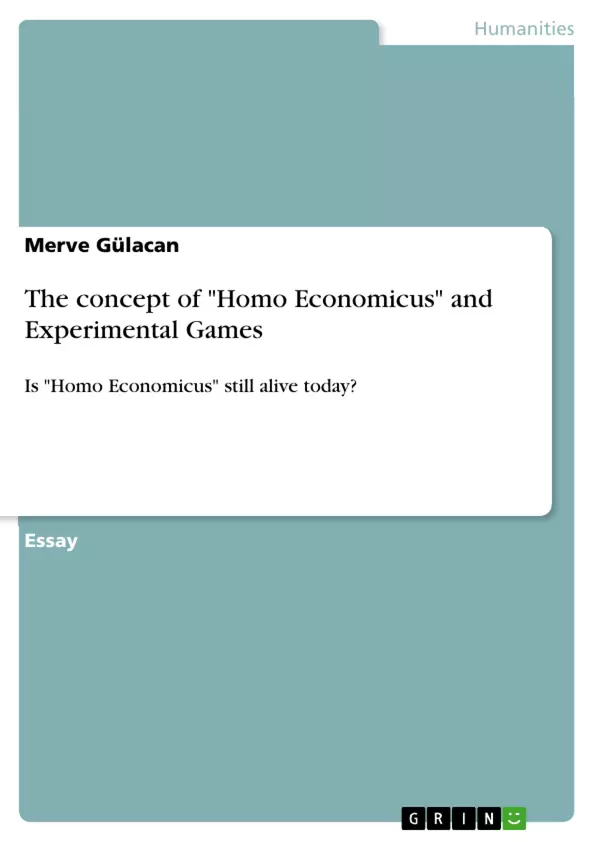The findings of research in experimental behavioural economics over the past two decades have been impressively convincing. Until recently, economists assumed that individual behaviour is controlled by rationality. The consumer was perceived as a rational person who strives to maximize his utility. This is the concept of homo economicus, a prototype of an economic person and starting point for model formulation. However, this theory often overlooks the fact that homo economicus is not a person of flesh and blood, but a conceptual notion.
Experimental evidence shows that the behaviour forecast by the standard model often does not correspond to reality. Factors like fairness, trust and moral values also play a role in the decision-making of the real economic actor. The knowledge gleaned from the observation of different negotiation plays provides the possibility for the derivation and representation of individual behaviour patterns. But the studies’ findings reveal that feelings of fairness, generosity and trust play a crucial role for the results. The object of this work is to find an answer to the question if homo economicus is still alive or not. Therefore I will consider different experiments of the dictator game from the literature. Experimental games offer good possibilities for the representation and derivation of individual behaviour patterns.
Chapter 2 presents the concept of homo economicus and describes his properties. Chapter 3 deals with experimental games, with the major focus being on the dictator game. Individual studies will be presented. The last chapter concludes.
Inhaltsverzeichnis (Table of Contents)
- Introduction
- The concept of Homo Economicus
- Properties of Homo Economicus
- Criticism
- Experimental Games
- Dictator Game
- Findings
- Criticism of experimental economics
- Conclusion
Zielsetzung und Themenschwerpunkte (Objectives and Key Themes)
This essay aims to investigate the concept of Homo Economicus and determine if it accurately reflects real-world economic behavior. The essay examines experimental games, particularly the dictator game, to assess the influence of factors such as fairness, trust, and moral values on economic decision-making.
- The concept of Homo Economicus and its assumptions
- The role of rationality in economic decision-making
- The limitations of the Homo Economicus model
- The influence of non-economic factors on economic behavior
- The implications of experimental games for understanding economic behavior
Zusammenfassung der Kapitel (Chapter Summaries)
The introduction presents the concept of Homo Economicus as a rational economic actor who maximizes utility. It highlights the limitations of this model in light of experimental findings that demonstrate the influence of non-economic factors on decision-making.
Chapter 2 delves into the concept of Homo Economicus, exploring its properties, such as rationality and utility maximization. It discusses the limitations of this model and the need to consider alternative explanations for economic behavior.
Chapter 3 focuses on experimental games, particularly the dictator game. It examines the findings of various studies and explores the implications of these findings for the concept of Homo Economicus.
Schlüsselwörter (Keywords)
The primary keywords and focus topics of this essay include Homo Economicus, rationality, utility maximization, experimental games, dictator game, fairness, trust, moral values, and behavioral economics.
Frequently Asked Questions
What is the "Homo Economicus" concept?
Homo Economicus is a theoretical model of a rational person who consistently strives to maximize their own utility or profit, serving as a starting point for many economic models.
How does experimental economics challenge the Homo Economicus model?
Experimental evidence shows that real actors are influenced by non-rational factors such as fairness, trust, and moral values, which the standard model often overlooks.
What is the Dictator Game in experimental economics?
The Dictator Game is an experiment where one player (the dictator) decides how to split a sum of money with another player. Rational self-interest would predict the dictator keeps everything, but in reality, many share due to fairness.
Why are trust and generosity important in economic negotiations?
Studies show that feelings of trust and generosity play a crucial role in the outcomes of negotiations, leading to more cooperative behavior than pure rationality would suggest.
Is the Homo Economicus model still considered "alive"?
The work explores this question by comparing theoretical forecasts with reality, suggesting that while useful for models, it does not fully represent a "flesh and blood" human actor.
- Citar trabajo
- Merve Gülacan (Autor), 2015, The concept of "Homo Economicus" and Experimental Games, Múnich, GRIN Verlag, https://www.grin.com/document/320397



